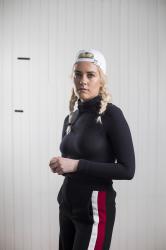Börn. It means “children.” This wasn’t the original name of the Reykjavík-based death-punk outfit, I’m told. So I ask where it came from. All four members laugh and look at each other expectantly, as if silently working out who is going to spill some juicy beans.
Finally Júlíana, the bassist, steps up. “We got to Börn,” she says somewhat conspiratorially, “after a violent feud with a local black metal band.” “Norn,” drummer Fannar immediately clarifies, so there’s no mistake, “They stole our name.” Anna Guðný, the guitarist, rolls her eyes at the others. Reserved and undramatic, she calmly adds, “No, we both started around the same time.” “No!” Júlíana, who is clearly the most audacious, disagrees. “We were first!” This starts a little bit of an argument as everyone tries to figure out the semantics of the timeline. Finally, singer Alexandra sets the story straight, relaying it all empirically. “We put out stuff first, but they were playing more shows, so they got better known as Norn.” “I like the new name better though,” Fannar adds with a shrug.
Norn means “witch,” by the way.
Little moments like these are the nörm in Börn. Hanging out with them, I feel like I’m observing a group of siblings; that’s how tight their relationships are. Holding nothing back, the four have an obvious love for each other that’s infectious. They finish each other’s sentences and practise standing in a circle, looking directly at each other—feeding off each other’s raw energy. They are just the warmest people—perhaps not what you’d expect from a group of dirty death-punkers.
Birthing Börn
“We wanted to start a metal band,” Fannar relays, “and we wanted to make it a political band.” Alexandra, Fannar, and Júlíana had previously played together in a group called Tentacles of Doom. For Börn, they enlisted their friend Anna Guðný, who they knew to play a little guitar. What is Börn’s ideology? “Personal politics. Feminism and ableism,” Alexandra says seriously. “Just our lives, you know.”
“We wanted,” Fannar continues, “to talk about body politics—body policing—because that is something we all have in common.” All members describe body policing as the intersection of feminism and ableism—other people claiming ownership over their bodies. “We’ve all had experiences with people touching us when we don’t want to be touched.” Júlíana explains, “or people commenting on our bodies that shouldn’t be commenting on our appearances.”
Alexandra looks at me seriously. “It’s so imprinted in our society, the imperative to look a certain way.” It’s obvious that none of Börn’s members acquiesce to that. Fannar is not only physically disabled, but he’s also covered in tattoos and dresses like a hardened punk. Alexandra has a shaved head, and Júlíana sports some luridly blue hair. One song of theirs is called (in translation) “You Owe Me Your Sexiness.” It’s loud with strong guitars, a heavy bassline, and Alexandra’s brazen sing-song screams overwhelming it all. The song is about being a woman in public spaces, about how, Júlíana explains, “men, or other people, feel that you owe them, that they’re entitled to your appearance to be good.” She boils it down for me, “You owe me to look sexy for my eyes.”
Setting the record straight
“No!” They all start shaking their heads and laughing when I ask about Iceland being a so-called feminist paradise, as it’s often referred to in the media, but there’s an underlying seriousness and cynicism to their smiles. “If things are that much better here than everywhere else,” Júlíana tells me, “I mean, how fucked up is everywhere else?”
The group starts discussing Iceland’s notorious drinking culture, and how people forego personal responsibility when drunk. They mention the annual Westman Islands festival. “It’s just kind of scary that this festival is partly known for sexual assault,” Fannar states. They mention Eistnaflug—the metal festival in the east—where there were only six women playing the main stage.
Albeism is another story. “No one really talks about it,” Fannar tells me, before revealing something shocking: there are no venues in Reykjavík that are fully wheelchair accessible. “So people ask, ‘I wonder why there are no people in wheelchairs who come to our shows?’” Júlíana says, “You’re not going to feel welcome if you can’t get in through the door.”
Pure punk
But it’s Börn’s music and style on stage—rather than their Icelandic lyrics, which I cannot understand—that first hooked me onto the band at Eistnaflug. Their gritty, raw, and emotive punk is weirdly relatable. Their music is angry, despairing, yet confident. It’s cathartic. Now, understanding their ideology, I get it. The punk is therapeutic. For them, too.
So, what’s next for Börn? They tell me they’re working on an album, which should be out by the beginning of the year, and are planning a subsequent European tour. They all seem relaxed and comfortable with the direction the band is taking.
Börn will be good for you. It’s time to jump on the Börn-wagon.
—
Börn are playing at Kaffibarinn with Reykjavík!, Bent snd Arnljótur Sigurðsson on August 29 at 21:00. Admission is free!
See Also:
 BÖRN DRUMMER FANNAR PRESENTS: TEN PUNK BANDS TO SEEK OUT!
BÖRN DRUMMER FANNAR PRESENTS: TEN PUNK BANDS TO SEEK OUT!
FIVE ICELANDIC PUNK BANDS TO SEEK OUT & FIVE NON-ICELANDIC PUNK BANDS TO SEEK OUT!
Airwaves, BÖRN Are Coming Atcha
BÖRN (“Children”) took the Icelandic punk scene by storm this year, playing all over the place, releasing a self-titled debut LP (which our reviewer LOVED) and even raising a little stir outside of the country. Although BÖRN have been active for upwards of four years, 2014 marks the first time they’re playing Iceland Airwaves—to celebrate this, we emailed singer Alexandra Ingvarsdóttir about the band, feminism and how miserable Reykjavík is.
Buy subscriptions, t-shirts and more from our shop right here!




















